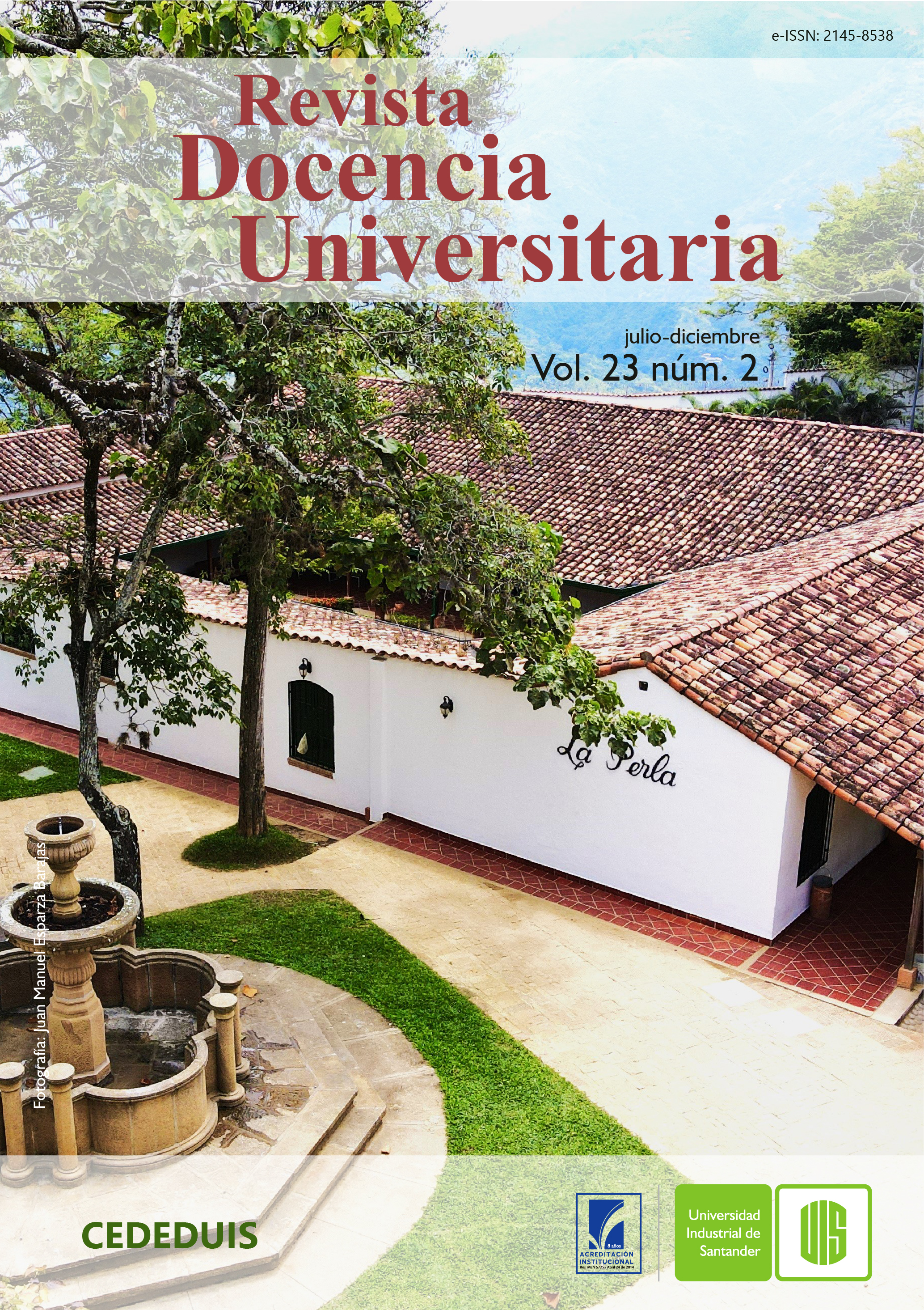Published 2022-12-30
Keywords
- education,
- pedagogy,
- ICT,
- significant learning
How to Cite
Copyright (c) 2022 Revista Docencia Universitaria

This work is licensed under a Creative Commons Attribution 4.0 International License.
Abstract
The research was based on the field experience with a group of students in the seventh grade of the Madre Gabriela Educational Institution in 2019, in the city of Cartagena, Colombia. First, it was analyzed how the mathematical performance of the students could be improved with respect to the subject of fractional numbers, through the application of a software was implemented a pedagogical strategy of meaningful and autonomous learning, oriented to the motivation of students, adapting the traditional activities of evaluation in fractional numbers to the Virtual Learning Object (hereinafter VLO) proposed as a strategy that allows visualizing the before and after exercise with the technological tool and describing the importance and actions to be performed based on the learning of seventh grade mathematics for the advancement to higher levels. The research is typified as a quantitative experimental study, conceived from a descriptive approach. This process adopted a statistical method of application and analysis of hypotheses through contingency tables, within which were recorded the data of the experience before and after the adoption of the computer application, to a group of 60 students; the findings allowed concluding that the final results of the evaluations are not unrelated or independent of the change in the pedagogical strategy used in the proposed software. From this, it is concluded that the use of Virtual Learning Objects mediated by pedagogical strategies facilitates the learning process and performance of students in a significant way.
Downloads
References
- Aragón, H. (2023). El aprendizaje de números fraccionarios mediado por una aplicación de video juego en estudiantes de grado séptimo. Ciencia Latina Revista Científica Multidisciplinar, 7(5), 5205-5219
- Hernández-Sampieri, R. y Mendoza, C. (2018). Metodología de la investigación: las rutas cuantitativa, cualitativa y mixta. Mc. Graw Hill.
- García-González, L. y Solano-Suárez, A. (2020). Enseñanza de la matemática mediada por la tecnología. EduSol, 20(70), 84-99. http://scielo.sld.cu/scielo.php?script=sci_arttext&pid=S1729-80912020000100084&lng=es&tlng=en.
- Martínez, C. (1986). Estadística Apuntes y 600 Problemas Resueltos. ECOE Editores.
- Ministerio de Educación Nacional de Colombia. (2006). Estándares Básicos de Competencias en Lenguaje, Matemáticas, Ciencias y Ciencias Sociales. Imprenta Nacional de Colombia.
- Novak, J. D., y Gowin, D. B. (1988). Aprendiendo a Aprender. Martínez Roca.
- Organización para la Cooperación y Desarrollo Económicos. (OCDE). (2018). Programa para la Evaluación Internacional de Alumnos (PISA). https://www.oecd.org/pisa/publications/PISA2018_CN_COL_ESP.pdf
- Parra Garzón, L. V. (2017). Objeto virtual de aprendizaje para capacitar a docentes de la Universidad Militar Nueva Granada en el contexto de la era digital. [trabajo de grado] Universidad Militar Nueva Granada. Repositorio Universidad Militar Nueva Gtranada. http://hdl.handle.net/10654/17239.
- Parra, O. (2021). Ventajas del trabajo colaborativo para el aprendizaje de los números fraccionarios. Revista Seres y Saberes, 65-69. https://revistas.ut.edu.co/index.php/SyS/article/download/2430/1862
- Pascuas, Y., Jaramillo, C. y Verástegui, F. (2015). Desarrollo de objetos virtuales de aprendizaje como estrategia para fomentar la permanencia estudiantil en la educación superior. Revista Escuela de Administración y Negocios, (79), 116-129. https://doi.org/10.21158/01208160.n79.2015.1271
- Piñeros, J. C. (2020). La tecnología en la enseñanza: una oportunidad para migrar hacia una educación pertinente. Revista Docencia Universitaria, 21(2), 35-53. https://doi.org/10.18273/revdu.v21n2-2020003
- Rojas Hincapié, C. (2015). Objetos virtuales de aprendizaje como herramienta para la enseñanza del álgebra en el grado octavo de la Institución Educativa Ana de Castrillón [tesis de maestría, Universidad Nacional de Colombia]. Repositorio Universidad Nacional. https://repositorio.unal.edu.co/handle/unal/55932
- Rueda, V. (2020). Método para la construcción de ova como servicios web [trabajo de Maestría] Universidad de Medellín. Repositorio institucional. https://repository.udem.edu.co/bitstream/handle/11407/6380/T_MIS_466.pdf?sequence=2&isAllowed=y
- Sánchez Eraso, J. K. (2018). Resolución de Problemas con Operaciones Básicas de Fraccionarios a partir de la Implementación de Objetos Virtuales basados en Páginas Interactivas de Uso Libre [trabajo de maestría]. Universidad Autónoma de Manizales. Repositorio institucional.
- Velasco Barreto, A. (2017). Estrategias para el fomento de la innovación en instituciones de educación básica y media, de carácter oficial: el caso de tres colegios en Cartagena de Indias (Colombia) [trabajo de maestría]. Universidad Tecnológica de Bolívar. https://biblioteca.utb.edu.co/notas/tesis/0073511.pdf

